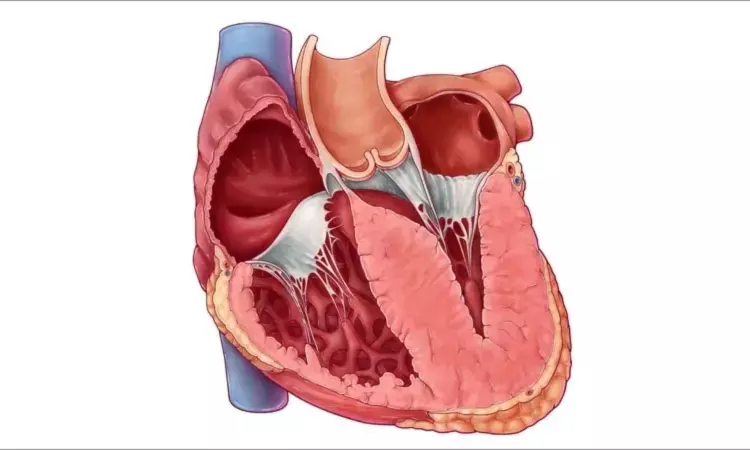- Home
- Medical news & Guidelines
- Anesthesiology
- Cardiology and CTVS
- Critical Care
- Dentistry
- Dermatology
- Diabetes and Endocrinology
- ENT
- Gastroenterology
- Medicine
- Nephrology
- Neurology
- Obstretics-Gynaecology
- Oncology
- Ophthalmology
- Orthopaedics
- Pediatrics-Neonatology
- Psychiatry
- Pulmonology
- Radiology
- Surgery
- Urology
- Laboratory Medicine
- Diet
- Nursing
- Paramedical
- Physiotherapy
- Health news
- Fact Check
- Bone Health Fact Check
- Brain Health Fact Check
- Cancer Related Fact Check
- Child Care Fact Check
- Dental and oral health fact check
- Diabetes and metabolic health fact check
- Diet and Nutrition Fact Check
- Eye and ENT Care Fact Check
- Fitness fact check
- Gut health fact check
- Heart health fact check
- Kidney health fact check
- Medical education fact check
- Men's health fact check
- Respiratory fact check
- Skin and hair care fact check
- Vaccine and Immunization fact check
- Women's health fact check
- AYUSH
- State News
- Andaman and Nicobar Islands
- Andhra Pradesh
- Arunachal Pradesh
- Assam
- Bihar
- Chandigarh
- Chattisgarh
- Dadra and Nagar Haveli
- Daman and Diu
- Delhi
- Goa
- Gujarat
- Haryana
- Himachal Pradesh
- Jammu & Kashmir
- Jharkhand
- Karnataka
- Kerala
- Ladakh
- Lakshadweep
- Madhya Pradesh
- Maharashtra
- Manipur
- Meghalaya
- Mizoram
- Nagaland
- Odisha
- Puducherry
- Punjab
- Rajasthan
- Sikkim
- Tamil Nadu
- Telangana
- Tripura
- Uttar Pradesh
- Uttrakhand
- West Bengal
- Medical Education
- Industry
Diabetes Significantly Worsens Outcomes in Hypertrophic Cardiomyopathy, Meta-Analysis Finds

Iran: A new study published in the BMJ journal Heart has shown that adults with hypertrophic cardiomyopathy (HCM) who also have diabetes mellitus (DM) face significantly worse clinical outcomes than those without diabetes.
The findings are from a GRADE-based meta-analysis conducted by Seyedeh-Tarlan Mirzohreh and colleagues from the Cardiovascular Research Center, Tabriz University of Medical Sciences, Iran.
The researchers found that diabetes in HCM patients was associated with higher risks of all-cause mortality, heart failure, and atrial fibrillation (AF). The risk of AF was especially elevated among younger patients under the age of 50, suggesting that diabetes may accelerate disease progression in this population.
The systematic review and meta-analysis pooled data from eight observational studies involving approximately 47,592 adults with HCM. It led to the following findings:
- Patients with both hypertrophic cardiomyopathy (HCM) and diabetes had a 43% higher risk of all-cause mortality (OR 1.43) compared with HCM patients without diabetes.
- They had a 34% increased risk of developing heart failure (OR 1.34).
- The likelihood of atrial fibrillation (AF) was 41% higher in HCM patients with diabetes (OR 1.41).
- The association between diabetes and AF was particularly pronounced in patients under 50 years of age (OR 2.55).
- The risk of AF was less pronounced in patients with a body mass index (BMI) of 30 kg/m² or higher.
- HCM patients with diabetes had smaller left ventricular end-diastolic volumes (SMD −0.26).
- They also showed impaired global longitudinal strain (SMD 0.58), indicating subclinical systolic dysfunction.
- These structural and functional changes suggest diabetes may contribute to increased myocardial fibrosis and stiffness, worsening HCM severity.
The authors noted that evidence regarding other echocardiographic parameters, including ejection fraction, ventricular mass, and septal thickness, was inconclusive due to limited and heterogeneous data. However, the overall results remained consistent across sensitivity analyses, and the certainty of evidence was high for major clinical outcomes like mortality and heart failure.
According to the researchers, diabetes should be recognized as a clinically significant risk marker in HCM. They recommend that clinicians incorporate diabetes status into risk assessment models and emphasize regular rhythm and function monitoring for affected patients. Early detection and management of arrhythmias, as well as optimized metabolic control, could be crucial in reducing complications.
While the findings are robust, the authors acknowledged several limitations. The number of eligible studies was small, and most were observational, with variable follow-up durations and incomplete data on factors such as diabetes duration, HbA1c levels, and body mass index. The heterogeneity in imaging measures and lack of stratification by obstructive versus non-obstructive HCM types also limited detailed conclusions.
Despite these limitations, the study highlights that diabetes substantially worsens outcomes in patients with hypertrophic cardiomyopathy. The researchers emphasize the need for large-scale, prospective studies to explore whether targeted metabolic interventions can help modify the course of HCM and improve survival and quality of life in this high-risk group.
Reference:
Mirzohreh S, Deravi N, Javanshir E, et alImpact of diabetes on outcomes in hypertrophic cardiomyopathy: a GRADE meta-analysis. Heart Published Online First: 08 October 2025. doi: 10.1136/heartjnl-2025-326085
Dr Kamal Kant Kohli-MBBS, DTCD- a chest specialist with more than 30 years of practice and a flair for writing clinical articles, Dr Kamal Kant Kohli joined Medical Dialogues as a Chief Editor of Medical News. Besides writing articles, as an editor, he proofreads and verifies all the medical content published on Medical Dialogues including those coming from journals, studies,medical conferences,guidelines etc. Email: drkohli@medicaldialogues.in. Contact no. 011-43720751
Next Story


